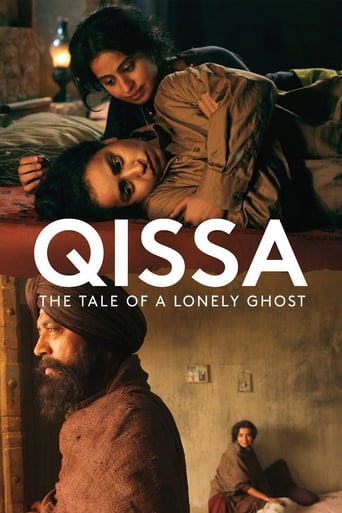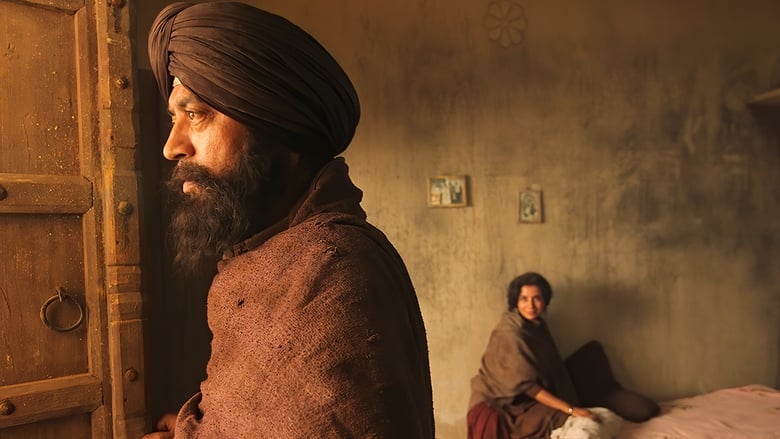

Qissa: The Tale of a Lonely Ghost (2013)
Set in post-colonial India, Qissa tells the story of Umber Singh, a Sikh who is forced to flee his village due to ethnic cleansing at the time of partition in 1947. Umber decides to fight fate and builds a new home for his family. When Umber marries his youngest child Kanwar to Neeli, a girl of lower caste, the family is faced with the truth of their identities; as individual ambitions and destinies collide in a struggle with eternity.
Watch Trailer
Cast


Similar titles
Reviews
What if you were the prisoner of desires? What if your construction was nothing but a quicksand of lies? All you gain is a house of cards. A ghost, so lonely by the defeat of his realism walks down the Punjab territory. Alas, the land gets bisected by a border, so violent! Such is the tale of Tillotama Shome's Kanwar being morally stabbed behind the curtain of sexuality. Anup Singh's Indian-German film 'Qissa-The Tale of a Lonely Ghost' is a cinematic sensation that goes down deep into your subconscious. In the hour of Partition, a Sikh resident of the now Pakistan seeks shelter in Punjab, India with his wife and three not so desired for daughters. Thus is what Irrfan Khan's Umber Singh, wishing for a boy out of Mehar's (Tisca Chopra) womb. When the fourth daughter is born, he persists on bringing her up as a son. Kanwar, in disguise of a son prepares herself as a boy. An adolescent love gets injected in the form of Neeli (Rasika Dugal) followed by a marriage. The beginning of a new relationship calls for the end of what was so far a sexual illusion.Director Anup Singh does true justice in maintaining the patience of being brave as he successfully makes the non-chronological phantasm work in a meter of realism as well as surrealism. The second half of the story takes a sudden realistic turn as it is revealed in the posters of the film. If realism is the false fall, surrealism gives the definite land in the plot.With the evergreen brilliance of Irrfan Khan, the acting has reached a summit of what one can hardly comment about. The soliloquy presented to the dead sands is like a perpetual cycle of fate that cries in the tone of,"Naa aadmi, naa aurat. Naa jeev, naa pret." Tillotama Shome, famous for her serious portrayals has once again nourished the excellence of her virtue. With an innocent boldness and an intense artistry, her character is like a flame, the delusion of which stays on even after it gets extinguished. Tisca Chopra and Rasika Dugal has also contributed their magnificence in sculpting this master class.A warm tone cinematography throughout the film along with the immaculate sound mixing has successfully provided for balancing the tension with the 'what happens next' feeling. A well edited synchronization with the proper synthesis of music has given the film a strong circumference.The audience leaves the theatres with some serious question marks haunting their grey scale. The well cooked delicacy of a sexually exposed Kanwar with the fog of Neeli's existence is the best abstract that gets nailed into your brain. The posters came out with a Mira Nair quote terming the film as a "masterpiece." 'Qissa-The Tale of a Lonely Ghost' is not a onetime watch. Watch, leave and watch again
The concept of the movie is quite different and the acting of Irfan Khan, Tisca Chpra and Tillotama Shome is commendable. The movie depicts a bitter truth of our society which is still prevalent in many regions, and that is the desire of a son and discrimination between sons and daughters. To desire is not a sin, but to go beyond reality to fulfill your desire is definitely a sin and a bane for the society and the people associated with it. The movie becomes quite confusing at some point and one is not able to decide whether Irfan Khan is really a ghost or not. Even though the movie went quite slow in between and lost the interest of audience in between, it is definitely a one time watch for people who like movies with different concepts.
Qissa is a visually stunning film with multiple concurrent themes running through it, ranging from patriarchy, partition, parochialism and even briefly same sex relationships. Partition was vividly depicted in a more sensitive way than I've seen before on screen. The film turns out fine performances from an array of actresses including Tisca Chopra and Tillotama Shome. It's also probably no coincidence that Irrfan Khan, a Muslim, was cast in a Sikh role; something that adds an unspoken gravitas to the part of Umber Singh given the historical context. The multiple scenes shot around wells will resonate with any person whose family was scarred by the partition of the Punjab; from either side.The presence of German funding is evident (although India's NFDC are part-funders); this is an independent non-commercial drama with a visible budget behind it. This lends an almost epic feel to some of the earlier scenes that would have been surely lacking without the European financial input. The score, by a French composer I believe, is excellent and an integral part of the film; although heavy on Indian motifs, it sounds decidedly un-Indian in structure. That's not a criticism, rather a refreshing bonus for the film that benefits from its soundscape. The music is also suggestive and never overpowering. The two vocal tracks are from the outstanding Nooran Sisters, Punjabis themselves, with thankfully no mainstream Bollywood singers in sight.As always Khan delivers an impeccable performance although the character does come across as one-dimensional at times; probably more to do with the script that his actual performance. The stand-out performances come from Shome as the 'son' Kanwar, and Raskia Dugal as his gypsy wife, Neeli. The chemistry, friction, pain and ultimately tenderness between these two is the highlight of the film. I would argue that Raskia Dugal almost upstages the other leads with her brilliant performance, particularly in the later scenes where the couple have fled their home. Kanwar's confusion also comes across as genuine, a credit to Shome's portrayal in a difficult role, while the nude scene, a critical part of the plot- is sensitively handled.My criticism of the film comes with the 'ghost' scenes; had the English title of the film not had "The Tale of a Lonely Ghost" appended to it (an unnecessary expanded titling, in my opinion); the initial scenes where Khan returns are momentarily confusing. It's not clear if he is a ghost or not, although that ambiguity may be intentional- or possibly I was a bit slow to pick up on it despite seeing his apparent demise earlier. Although parts of the film come across as dream-like, these initial ghost scenes don't and for that reason it's unclear if Kanwar is imagining Khan's appearance or not. These are minor points in an otherwise good film though, but the film still throws open many questions such as who and why where others complicit in the deceit, and why did the mother not put up resistance to the charade, amongst others.This is the kind of film that will do very well at film festivals, and deservedly so, but is probably too complex and intelligent for wider mainstream appeal-- in say a way some more accessible Deepa Mehta films would. It will be interesting to see what reception the film receives when it is ultimately released in India.Director Anup Singh has done a good job of bringing to life an intricate story that is unlike any other recent Indian film out there. Recommended.
I had a chance to see the film "Qissa" while it screened at the South Asian Film Festival in New york. Not knowing the premise of the film, what struck me most was the depth of the different characters portrayed in the story. Actors Irfan Khan and Tillotama Shome displayed a beautiful and sensitive chemistry playing the father-daughter duo, replete with complex emotional struggles and seemingly unsurmountable conflicts. The interpersonal relationships between the characters were touching and real despite the darkness that surrounded them. Tillotama's gender-transcending portrayal of a complex and conflicted "Kanwar" was seamless and simply blew me away!








